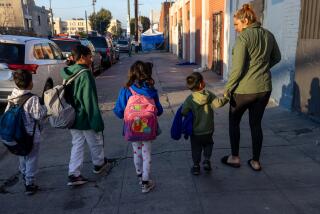Federal Program Gives Teen-Agers Summer Work
- Share via
WICHITA, Kan. — Quintis Pinkston rolled out of bed before dawn Saturday and, with his mother at his side, got in line at a community center to apply for his first job.
The lanky 14-year-old is one of thousands of youngsters from poor families around the country getting a summer job because of a $500-million federal bonanza designed to keep them off the streets and out of trouble.
“It was on the news and everybody was talking about coming. . . . We decided we’d better come early,” said Quintis, who spent 2 1/2 hours napping and working on a pencil drawing before the center opened at 8 a.m.
What everybody was talking about was a $1-billion urban aid package--half of which goes to provide summer jobs.
Wichita was allocated $596,000 to provide 220 jobs. The pay is minimum wage--$4.25 an hour--and the eight-week jobs in city departments include clerical work and mowing grass in parks.
“There are a lot of kids out there who need jobs,” said Quintis’ mother, Patricia Patterson. “They can be busy and off the streets this way. And they’ll have some money of their own for school clothes or what they want to select.”
Congress appropriated the money in response to the Los Angeles riots. The aid is intended to put 414,000 teen-agers to work nationwide this summer. About $100 million went directly to the 75 largest cities; the rest was given to the states to distribute and to smaller cities in the form of direct grants.
The program targets 14- to 21-year-olds in secondary or vocational schools or college. Applicants must come from families with poverty-level income. The pay varies from city to city.
Many of the youngsters gathered outside the Wichita center gave the same answer when asked what they would do this summer without jobs: “Nothing.”
Ninety minutes after city workers began taking applications, about 100 youngsters had made it inside the building. Twice as many waited outside.
“This is kind of the turnout I expected,” said Erline Wesley, city personnel director. “We didn’t have much time to get the word out. Usually for our regular summer jobs program we have at least two applicants for each available job.”
Quintis was lucky. He got a job in the department he preferred--public works--and will spend the summer cleaning city vehicles and doing maintenance work on city buildings.
He rolled his eyes and looked at the ground when his mother beamed: “He’s so happy. It’s his first job. He’s so excited.”
The usual process of filling summer jobs in Wichita includes extensive interviews and counseling. But the supplemental program calls for the youths to begin work Monday, leaving no time for lengthy interviews.
Besides news stories and radio advertisements, the word went out in Wichita with portable signs parked at businesses in the mostly black northeast section of town.
Other cities used lists of applicants left over when regular summer jobs programs filled up. In Miami, 300 youngsters were left over. The jobs include landscaping, painting and other projects in the youngsters’ own neighborhoods.
“Our goal is to try to get as many kids working as we can and get a meaningful summer for them,” said Dan Fernandes, Miami’s youth projects director.
Some cities use community groups to help fill the jobs. St. Paul, Minn., relies on youth councils.
“With youth councils, you can set up innovative programs such as the tutoring programs, where older kids are working with younger kids,” said Kay Tracy, youth programs director for the Minnesota Department of Jobs and Training.
Newark, N.J., offers some of its summer youth program jobs at Newark International Airport so youngsters can be exposed to the airline industry.
More to Read
Sign up for Essential California
The most important California stories and recommendations in your inbox every morning.
You may occasionally receive promotional content from the Los Angeles Times.













